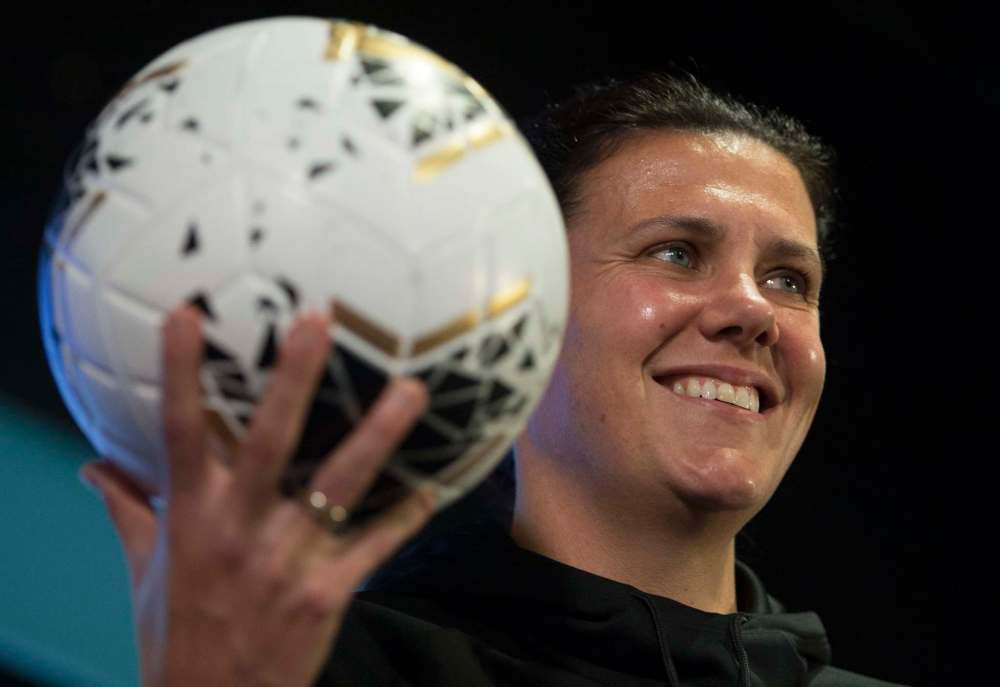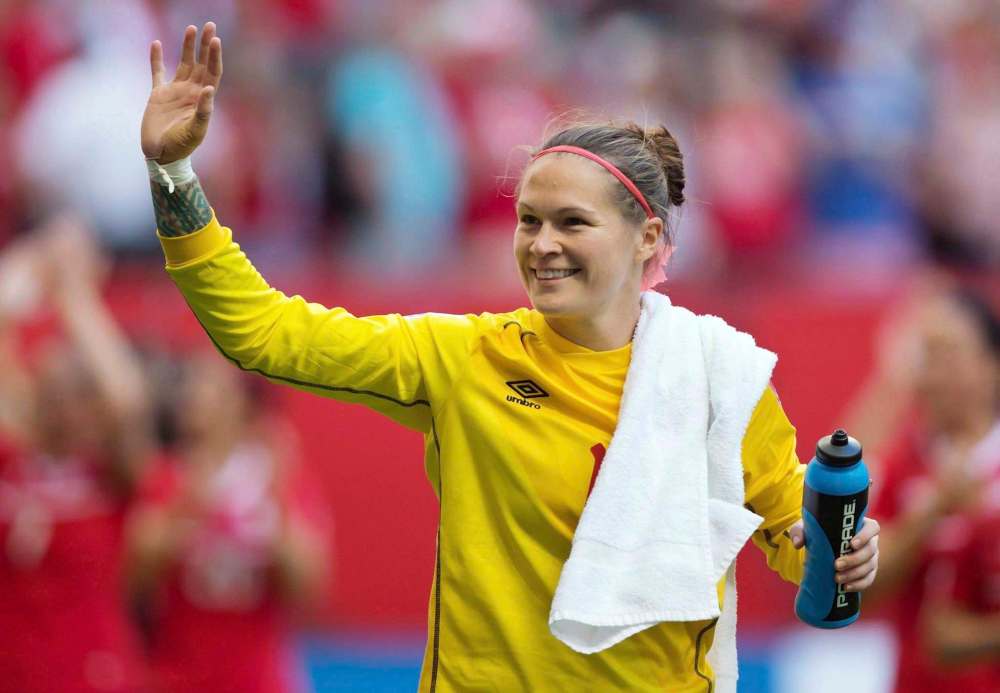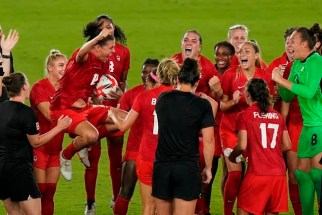Time for wealthy to step up for women Women's sports leagues desperately lacking in Canada
Read this article for free:
or
Already have an account? Log in here »
To continue reading, please subscribe:
Monthly Digital Subscription
$0 for the first 4 weeks*
- Enjoy unlimited reading on winnipegfreepress.com
- Read the E-Edition, our digital replica newspaper
- Access News Break, our award-winning app
- Play interactive puzzles
*No charge for 4 weeks then price increases to the regular rate of $19.00 plus GST every four weeks. Offer available to new and qualified returning subscribers only. Cancel any time.
Monthly Digital Subscription
$4.75/week*
- Enjoy unlimited reading on winnipegfreepress.com
- Read the E-Edition, our digital replica newspaper
- Access News Break, our award-winning app
- Play interactive puzzles
*Billed as $19 plus GST every four weeks. Cancel any time.
To continue reading, please subscribe:
Add Free Press access to your Brandon Sun subscription for only an additional
$1 for the first 4 weeks*
*Your next subscription payment will increase by $1.00 and you will be charged $16.99 plus GST for four weeks. After four weeks, your payment will increase to $23.99 plus GST every four weeks.
Read unlimited articles for free today:
or
Already have an account? Log in here »
Hey there, time traveller!
This article was published 16/08/2021 (1576 days ago), so information in it may no longer be current.
When Christine Sinclair talks, particularly about the state of the sports world, we’d all be wise to listen. Our most decorated soccer star had plenty to say the other day, raising some uncomfortable truths when it comes to the different way we often treat gender in this country.
While there’s seemingly no shortage of opportunities for men looking for a place to play, it’s a much different story for women.
“Honestly, it just takes some wealthy individuals within Canada willing to invest in women’s sports,” Sinclair said during a Zoom chat which began with her discussing winning the gold medal at the Summer Olympics in Tokyo but took a very interesting turn.
“Individuals do that on the men’s side, companies do that on the men’s side all the time and are willing to lose millions of dollars. I think within Canada it’s just finding people willing to do that on the women’s side of the game. To find some people with some deep pocketbooks willing to take a chance.”
She’s not wrong. Wealthy National Hockey League owners north of the border barely batted an eye as revenue streams dried up this past season playing in empty buildings. The Canadian Football League didn’t weather the COVID-19 storm quite as well, but they’re back on the field this summer despite suffering massive financial losses. Even the Canadian Premier League has played on during the pandemic, despite turning a profit being nothing more than a pipe dream at this point.

“We’re not there yet, that’s for sure. We’re going to be a few years into it,” CPL commissioner David Clanchan told the Canadian Press earlier this year of the eight-team loop, estimating it costs $4 million per year, per club, to keep things running. “Our owners know that. They’ve invested circa $60 million already in this league. We’re in a long-term game here.”
And yet, as we sit here today, there’s absolutely no game here for homegrown female soccer talent. The only option to ply their trade on a regular basis is to head south. Sinclair plays for Portland of the National Women’s Soccer League, which has 10 teams all in the United States. Teammate Desiree Scott, a Winnipegger, gets her kicks in Kansas City.
There’s something very wrong with that picture.
Consider this: More than 4.4 million viewers tuned in to see Sinclair and company down Sweden in the gold medal game, despite the fact it happened in the early morning hours. That is a massive television number, suggesting this is not a matter of interest, or lack thereof, in the women’s game. To put that in perspective, an average audience of 3.9 million tuned in to watch the Winnipeg Blue Bombers down the Hamilton Tiger-Cats in the 107th Grey Cup back in November 2019.
“So a lot of times people say there’s not enough interest in women’s sport and that’s BS,” Canadian keeper Erin McLeod told the Orlando Sentinel last week as she returned to Florida to play for her club, the Pride, in the NWSL.
“It’s really important to give the younger generation something to aspire to in their own backyard.” – Desiree Scott
It’s not a matter of the on-field results, either, given that Canadian men didn’t even qualify for the Tokyo Games, and haven’t reached the Olympics since 1984. And yet, they have their own league in the Great White North, while the women — now with three consecutive podium finishes since 2012 — do not. Women were responsible for 18 of the 24 medals in Tokyo, a Canadian record for a non-boycotted year, including five of the seven gold. In Rio back in 2016, women won 16 of the 22 medals, and three of the four gold.
“We’re hoping that this platform will give us the opportunity to start that change and plead to Canadians that have the ability to make the difference to invest in women,” said Sinclair. “The young little kids, they deserve to be able to go watch their heroes on a weekly basis, not just once every four years.”
Sinclair is too polite to call anyone out by name, so I will: Paging David Thomson, Mark Chipman, Geoff Molson, Daryl Katz, Francesco Aquilini, Larry Tannebaum, Eugene Melnyk and Murray Edwards. Those eight men, who all have major ownership stakes in the seven Canadian NHL clubs, are just the kind of deep-pocketed people Sinclair is referring to. They have the resources and the connections to make it happen, yet have remained strangely silent on this important issue.
There are many others, too, including big media conglomerates such as Rogers and Bell Media which have shown absolutely no hesitation to throw ample support and resources towards the men, yet are conspicuous by their absence when it comes to providing similar opportunities for women.
When is one or more of them going to take the chance Sinclair is calling for? This wouldn’t simply be a charity case, either, but a potentially sound investment. Canadian women are on top of the world, even if they are being given short shrift in their own backyard.

This problem goes beyond the pitch. Since the Canadian Women’s Hockey League folded in 2019, there’s been a major void in this country yet to be filled. Currently, the main option is the six-team National Women’s Hockey League, which consists of five U.S. clubs and the Toronto Six. There’s also the Professional Women’s Hockey Players Association, born out of the ashes of the CWHL, which has five hubs in North America — including Calgary, Toronto and Montreal — as part of its Dream Gap tour. But they, too, are struggling to get traction.
Finding full-time sponsorships, broadcasting agreements and other revenue streams has been a major challenge, despite the fact our female athletes constantly shine on an international hockey stage.
Here in Manitoba, we’ve been blessed with watching the success of some truly elite women over the years — from the likes of Connie Laliberte and Jennifer Jones on the curling rink, Jennifer Botterill and Sami-Jo Small on the ice, to Clara Hughes, Cindy Klassen and Susan Auch at the Olympics. Now, coming out of Tokyo, you can add Scott’s name to that list. Like Sinclair, she’s also throwing down the gauntlet and suggesting it’s time to stop ignoring what women in this country are accomplishing — while ensuring existing roadblocks to sustained success are removed.
“It’s really important to give the younger generation something to aspire to in their own backyard,” Scott told me in a wide-ranging interview last week, in which she hoped to carry the momentum from Tokyo into the future.
It certainly is. But until the power brokers in this country stop paying lip service to gender equity and truly put their money where their mouth is, the playing field will continue to be anything but level.
mike.mcintyre@freepress.mb.ca
Twitter: @mikemcintyrewpg

Mike McIntyre grew up wanting to be a professional wrestler. But when that dream fizzled, he put all his brawn into becoming a professional writer.
Our newsroom depends on a growing audience of readers to power our journalism. If you are not a paid reader, please consider becoming a subscriber.
Our newsroom depends on its audience of readers to power our journalism. Thank you for your support.








